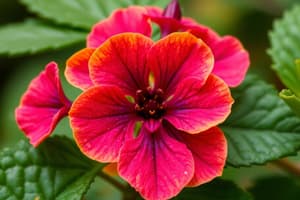Podcast
Questions and Answers
What is the product of acid hydrolysis of Diosmin?
What is the product of acid hydrolysis of Diosmin?
- Diosmitin, glucose, and quercetin
- Diosmitin, glucose, and quercetin
- Diosmitin, glucose, and rhamnose (correct)
- Diosmitin, rhamnose, and rutinose
What is the chemical structure of Rutin?
What is the chemical structure of Rutin?
- 5,7,3´,4´-tetrahydroxy flavanone-3-O-glucoside
- 5,7,3´,4´-tetrahydroxy flavanone-3-O-rutinoside
- 5,7,3´,4´-tetrahydroxy flavone-7-O-glucorhamnoside
- 5,7,3´,4´-tetrahydroxy flavonol-3-O-rutinoside (correct)
What is the pharmacological effect of Diosmin?
What is the pharmacological effect of Diosmin?
- It is used to treat urinary tract infections
- It is used to treat capillary fragility and hemorrhoidal disease
- It is used to treat menorrhagia and varicose vein
- It is used to treat all of the above (correct)
What is the classification of Diosmin?
What is the classification of Diosmin?
What is the product of enzymatic hydrolysis of Rutin?
What is the product of enzymatic hydrolysis of Rutin?
What is the biochemical property of Rutin?
What is the biochemical property of Rutin?
What is the source of Diosmin?
What is the source of Diosmin?
What is the brand name of Diosmin-containing tablets?
What is the brand name of Diosmin-containing tablets?
What is the general structure of flavonoids?
What is the general structure of flavonoids?
What is the origin of one of the benzene rings in flavonoids?
What is the origin of one of the benzene rings in flavonoids?
What is the effect of alkalies on flavonoids?
What is the effect of alkalies on flavonoids?
What is the therapeutic use of flavonoids containing plants as buchu?
What is the therapeutic use of flavonoids containing plants as buchu?
What is the biochemical property of flavonoids?
What is the biochemical property of flavonoids?
What is the effect of conc.H2SO4 on flavones and flavonols?
What is the effect of conc.H2SO4 on flavones and flavonols?
What is the classification of flavonoids based on their structure?
What is the classification of flavonoids based on their structure?
What is the pharmacological effect of isoflavone derivatives?
What is the pharmacological effect of isoflavone derivatives?
What is the result of the reaction between flavonoids and Wilson's reagent?
What is the result of the reaction between flavonoids and Wilson's reagent?
What is the effect of aluminium chloride on flavonoids?
What is the effect of aluminium chloride on flavonoids?
What is the purpose of Shinoda's test?
What is the purpose of Shinoda's test?
What is the basic skeleton for all types and classes of flavonoids?
What is the basic skeleton for all types and classes of flavonoids?
What is the result of the isomerization of flavanones?
What is the result of the isomerization of flavanones?
What is the reaction between flavonoids and lead acetate?
What is the reaction between flavonoids and lead acetate?
Study Notes
Flavonoids
- Flavonoids are a large group of natural phenols derived from the parent substance flavone.
- They are amongst the dye stuffs and water-soluble pigments of plant origin, often yellow pigments.
- Flavonoids are derivatives of 1,3-diphenylpropane, with a C-15 skeleton formed of two benzene rings linked together by a pyran ring.
Structure and Classification
- The basic skeleton for all types and classes of flavonoids is flavan.
- Flavonoids are classified into different groups based on the presence or absence of OH- at C-3, ketone at C-4, and unsaturation between C-2 and C-3.
Identification and Characterization
- Flavonoids give yellow coloured precipitate with lead acetate.
- Flavonoids with free hydroxy group at C-5 react with boric acid and citric acid in anhydrous acetone to give a bright yellow colour with yellowish green fluorescence.
- Flavonoids form a yellow coloured complex with 5% alcoholic AlCl3.
- Alcoholic plant extract with Mg metal and conc. HCl gives red to violet or orange colour.
Occurrence and Uses
- Flavonoids are abundant in many plant families such as Rutaceae, Leguminosae, Umbelliferae, and Compositae.
- Flavonoids have various therapeutic uses, including as diuretics, antispasmodics, and antioxidants.
Flavone Glycosides
- Apiin is a flavonoid found in parsley, used as an antispasmodic and diuretic.
- Diosmin is a flavonoid found in Buchu leaves, used as a diuretic, urinary tract antiseptic, and in the treatment of peripheral vascular disorders.
Flavonol Glycosides
- Rutin is a flavonol glycoside found in Ruta graveolens and Eucalyptus, used to treat capillary fragility, hemorrhage, bleeding gums, hemorrhoidal disease, menorrhagia, and varicose veins.
Studying That Suits You
Use AI to generate personalized quizzes and flashcards to suit your learning preferences.
Description
This quiz is about the identification and characterization of flavonoids, including their reactions with lead acetate, boric acid, and other reagents.




